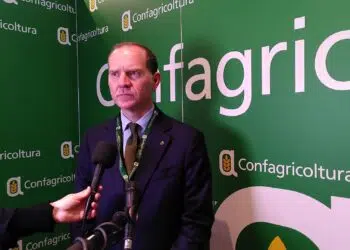Brussels – Stakeholders in the agri-food supply chain are lining up the most pressing issues that have led to the strong farmers’ protests in Brussels in particular (twice in less than a month). And it may not be only the EU’s environmental policies in the spotlight but also other long-standing factors. “The farmers’ problem did not start with the Green Deal, but over ten years ago with a series of misguided policies on fair pay for what they do and produce every day,” warned the chairman of the Agriculture, Rural Development and Environment (NAT) section of the European Economic and Social Committee (EESC), Peter Schmidt, at the “New coordinates for the sustainability of EU agriculture” event.
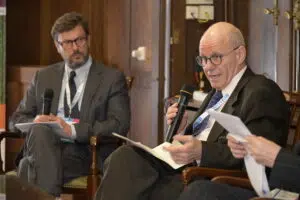
Organized today (March 5) in Brussels by Eunews and Gea – Green Economy Agency (both part of the Withub Group) the event focused—in its second panel titled “The contribution of the agri-food supply chain to a healthy European lifestyle”—precisely on the root causes of discontent in the agri-food sector. “We never talk about the interests within the supply chain,” Schmidt highlighted, reiterating that “the narrative that ‘there’s not enough money’ is wrong.” EESC stands by farmers, and that is precisely why “we need to look at how much the big multinationals get in terms of profit on turnover, between 16 and 18 per cent,” the NAT section chair continued. In the same vein was MEP Maria Angela Danzì (Five Star Movement), a member of the Committee on the Environment, Public Health and Food Safety (ENVI): “What the consumer pays at the supermarket is 80 per cent the cost of the supply chain that comes after the farmer.”
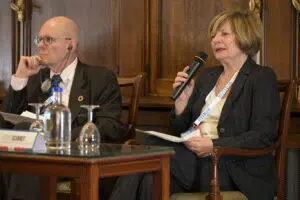
MEP Maria Angela Danzì (Five Star Movement)
The MEP recalled that “we need agricultural policies that incentivize small farmers; we would do more for the national interest if what they spend in terms of energy, materials and sacrifice was properly remunerated.” However, “I have not seen a strenuous fight on this in the European Parliament, as done on the defence of packaging,” was Danzì’s lunge regarding last night’s (March 4) outcome of the trilogue between the co-legislators of the EU Parliament and Council on the Packaging Regulation. Of the opposite opinion is the CEO of Filiera Italia and President of Eat Europe, Luigi Scordamaglia: “In the trialogue, an attempt was made to salvage something, but there was no return to the position of the EU Parliament that benefited those countries that had invested in recycling,” while it is described as “unacceptable” that the EU Commission inserted “a reservation on the Regulation because the Parliament and the Council have taken up our requests to insert the mirror clause,” i.e., that “all materials that are considered polluting in Europe cannot be imported from third countries.”
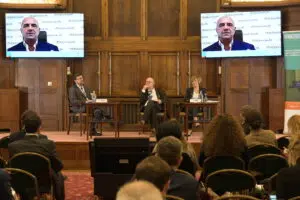
Filiera Italia CEO and Eat Europe President Luigi Scordamaglia
Scordamaglia agreed that “we need a more equitable distribution of value in the food supply chain, protecting agricultural production.” Still, he also stressed that “if we dismantle production of food and manufacturing with a misinterpreted environmentalism, the only option will be to import from third countries that pollute more.” Enlivening the discussion was the MEP for the Five Star Movement, who recalled how “the One Health approach can allow us not to make schizophrenic policies to protect the health of ecosystems, people, and animals,” but that in recent months “the discourse on Commission policies has been conditioned by vested interests, who have defined them as ‘mere environmentalist ideology.'” The coordinator of the #CambiamoAgricoltura coalition, Franco Ferroni, also attacked what he calls “agricultural negativism,” which bears “responsibility for climate change and biodiversity loss” since “the close connection between agriculture and the well-being of ecosystems does not find the same attention from farmers’ associations.”
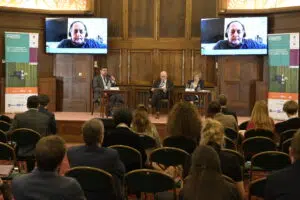
The coordinator of the #CambiamoAgricoltura coalition, Franco Ferroni
In his speech, Ferroni called for “reopening dialogue and confrontation” because “a climate of deliberate contrast between agriculture and the environment has been created that aimed to demolish the Green Deal strategy.” This is why the organization that brings together organizations supporting the reform of the Common Agricultural Policy (CAP) views the approval of the nature restoration law as “positive.” However, Filiera Italia CEO Scordamaglia disagrees: “There are 500 million European consumers who have to consume, and not all of them have the same spending capacity.” This means that “either they consume what is in Europe or what is produced in Mercosur by deforesting.” Scordamaglia went on to point out that “we countered the fact that, at a time when the world faces the most serious food security crisis, someone wanted to impose taking 10 per cent of land away from agriculture for the return of peatlands.”
English version by the Translation Service of Withub


